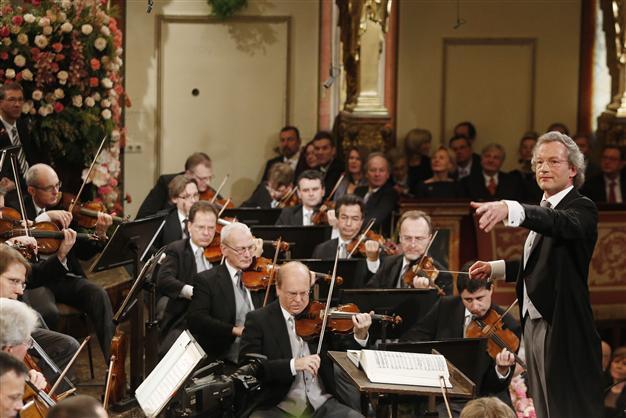Vienna Philharmonic lifts lid on Nazi history
VIENNA - Agence France-Presse

Austrian conducter Franz Welser-Moest (R) and the Vienna Philharmonic Orchestra perform the traditional New Years Concert on January 1, 2013 at the music association in Vienna, Austria. AFP Photo
The world-famous Vienna Philharmonic orchestra will publish details of its history during the Nazi era on Sunday, responding to years of accusations of a cover-up.Austria took several decades after World War Two to acknowledge and voice regret for its central role in Hitler's Third Reich and Holocaust. The country will solemnly mark the 75th anniversary on Tuesday of its annexation by Nazi Germany.
One of the world's premier orchestras, the Vienna Philharmonic is most popularly known for its annual New Year's Concert, a Strauss waltz extravaganza that is broadcast to an audience of more than 50 million in 80 countries.
Less well known is the fact that the concert originated as a propaganda instrument under Nazi rule in 1939. The orchestra rarely played the music of the Strauss family, known for the "Blue Danube" and numerous other waltzes, before this period.
The New Year's Concert helped promote Nazi Propaganda Minister Joseph Goebbels' desired image of Vienna. He wrote in his diaries that the Austrian capital should be seen as a city of "culture, music, optimism and conviviality".
Fritz Truempi, one of three historians commissioned by the orchestra to produce articles on the orchestra's Nazi era that will be published on its website, told Reuters: "The New Year's Concert was invented under the Nazis."
Details of 13 musicians who were driven out of the orchestra over their Jewish origin or relations after Germany's annexation of Austria in 1938 - five of whom died in concentration camps - will also be published on the site for the first time.
Bernadette Mayrhofer, another of the independent historians from the University of Vienna, said the ostracism of Jewish musicians had begun even before 1938 under Austrofascism, a period of Italian-oriented authoritarian rule in Austria.
"It was known whether somebody had Jewish roots or a Jewish wife," she told Reuters.
The Vienna Philharmonic has further promised to give more details on Sunday about a ring of honour it presented in 1942 to Baldur von Schirach, a Nazi governor of Vienna who oversaw the deportation of tens of thousands of Jews.
A replacement for the ring, which Schirach lost, may have been delivered to him in the 1960s, after his release from prison for crimes against humanity, according to Harald Walser, a Greens member of Austria's parliament, and others.
Cover-up allegations
Orchestra Chairman Clemens Hellberg, in his 1992 history of the Vienna Philharmonic, "Democracy of Kings", omits this incident. He has since said he did not have access to all the relevant documents when he wrote the book.
The orchestra, whose image is closely tied to the 18th century Vienna of Haydn and Mozart, has come under fire in recent years for not acknowledging the part its Jewish musicians played in its history, or its own collaboration with the Nazis.
Walser, one of the orchestra's most vocal and persistent critics, has demanded the Vienna Philharmonic open its archives for a full and open inquiry.
This weekend, he welcomed the orchestra's decision to become more transparent, although he said it did not go far enough.
"It's a little step in the right direction," he told Reuters. "But we're still a long way from having adequate access to the archives."
The three historians were given less than two months to fulfil their commission following a decision by the orchestra's management after this January's New Year's concert, an annual focal point for criticism.
The Vienna Philharmonic says it is not obliged to give public access to its archives, since it is a private organisation, although it does grant access to selected historians and scholars.
Truempi said it took him three years starting in 2003 to gain access to research his 2011 book "Das Politisierte Orchester" ("The Politicised Orchestra"), a study of the Vienna and Berlin Philharmonic orchestras under National Socialism.
The historian reckons that the orchestra has now finally come to a point where it realised that its long-held policy, designed to protect its brand, was actually harming its image.
"I see it also as an issue of image management. For a long time, they tried to maintain a strict control over their brand but, in the end, the political pressure became such that it was the best solution to open up," he said.
















